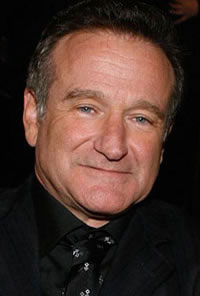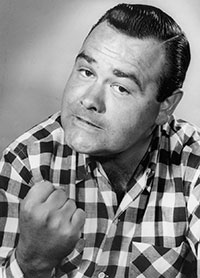
By: Joe Schimmel
Everybody is currently talking about Robin Williams and his tragic suicide. Many are puzzled as to how a man, who made so many people laugh, could be so depressed that he would violently end his life. What people are not learning is the deeper truth about the insidious forces that tormented Robin Williams and drove him to suicide.Robin Williams acknowledged that he had opened himself up to transformative demonic powers that aided him on stage. Without the aid of such demonic powers, it is likely that you would have never have heard of Robin Williams and many other famous celebrities. Williams also recognized that these powers had manifested a very evil influence on stage and that there could be a hefty price to pay for their assistance. Williams told James Kaplan of US Weekly:
“Yeah! Literally, it's like possession ‑ all of a sudden you're in, and because it's in front of a live audience, you just get this energy that just starts going…But there's also that thing ‑ it is possession. In the old days you'd be burned for it…But there is something empowering about it. I mean, it is a place where you are totally ‑ it is Dr. Jekyll and Mr. Hyde, where you really can become this other force. Maybe that's why I don't need to play evil characters [in movies], 'cause sometimes onstage you can cross that line and come back. Clubs are a weird kind of petri dish environment. I mean, that's where people can get as dark as they can in comedy ‑ in the name of comedy, be talking about outrageous stuff and somehow come out the other side. I mean, that's one place where you really want to push it” (Robin Williams, "Robin Williams,” by James Kaplan, US Weekly, January, 1999, p. 53).
Williams’ last statement quoted above answers the question as to why the demonic powers use entertainers. Their goal is to promote evil and darkness and increase mankind’s rebellion against God.
Williams went on to say on the heels of that admission:
“The people I've admired ‑ Jonathan [Winters], in his best days, was out. Gone. But the price he paid for it was deep” (Ibid).
Sadly, it seems that the price Robin Williams has now paid is just as deep as that of his idol, Jonathan Winters. In fact, in the same US Weekly Interview, James Kaplan says:
“With a gift for mimicry and improvisation that verged on demonic possession, Williams could even approach the artistry of his idol Jonathan Winters—a man whose genius took him, once or twice, over the edge into mental illness. Williams' own version of hell has been extensively chronicled” (Ibid).

At the height of Winter’s success, he voluntarily committed himself to a psychiatric hospital for eight months. Winters would later claim that if he were not careful, the authorities would put him back in the “zoo,” an obvious reference to the mental institution. Winters, like Williams, often fell into deep depression and struggled with heavy drinking.
While many only knew Robin Williams to be what they considered a somewhat "family friendly" actor, he was one of the most successful crude stand-up comics who ever lived. It was during his standup where he was most able to tap into what he calls “possession…Dr. Jekyll and Mr. Hyde… that's where people can get as dark as they can in comedy ‑ in the name of comedy” (Ibid).
It was in Williams’ stand-up where he would go into his manic, stream-of-consciousness rants filled with vulgar language, perverse sexuality and the glorification of illicit drugs and drunkenness. Many people express shock after seeing Williams' stand-up, not knowing his act was so perverse.
Comedians, like many famous musicians, pay the price for their fame by becoming enslaved to the demonic forces that possess and torment them. Jim Morrison, the frontman of America’s most successful band in the 60’s, admitted that he had to drink “to silence the constant voices of the demons” (James Riordin, “Break on Through: The Life and Death of Jim Morrison,” p. 23). The Door's photographer, Frank Lisciandro, stated that, “Jim drank to quiet the ceaseless clamor of the demons, ghosts and spirits. He drank because there were demons and voices and spirits shouting inside of his head and he found that one of the ways to quell them was with alcohol” (Ibid., p. 28).
Read the rest of this article at - http://www.goodfight.org/a_v_williams_robin.html